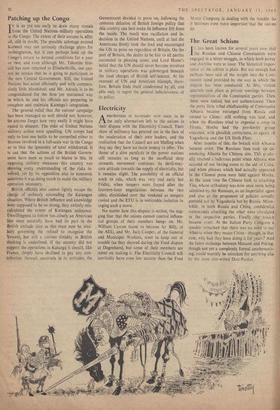Electricity
ARB1TRATION or surrender now seem to be the only alternatives left to the unions in their dispute with the Electricity Council. Their show of militancy has petered out in the face of the moderation of their own leaders, and the realisation that the Council are not bluffing when they say they have no more money to offer. The threat of a slow paralysis in the power stations still remains as long as the unofficial shop stewards movement continues its devil-may- care attitude towards the supply of electricity, but it remains slight. The possibility of an official work to rule, which was very real early last Friday, when tempers were frayed after the fourteen-hour negotiations between the two sides, diminished over the weekend as tempers cooled and the ETU is in noticeable isolation in urging such a move.
No matter how this dispute is settled, the nag- ging fear that the unions cannot control influen- tial groups of their members hangs on. Mr. William Carron (soon to become Sir Bill), of the AEU, and Mr. Jack Cooper, of the General and Municipal Workers, want to keep out of trouble (as they showed during the Ford dispute at Dagenham), but some of their members are intent on making it. The Electricity Council will inevitably have even less success than the Ford Motor Company in dealing with the trouble. So it becomes even. more important that the unions do.






























 Previous page
Previous page